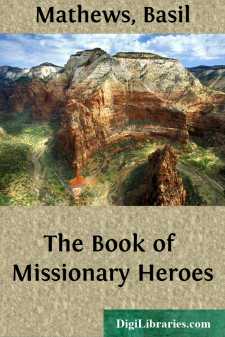Categories
- Antiques & Collectibles 13
- Architecture 36
- Art 48
- Bibles 22
- Biography & Autobiography 813
- Body, Mind & Spirit 141
- Business & Economics 28
- Children's Books 12
- Children's Fiction 9
- Computers 4
- Cooking 94
- Crafts & Hobbies 4
- Drama 346
- Education 46
- Family & Relationships 57
- Fiction 11826
- Games 19
- Gardening 17
- Health & Fitness 34
- History 1377
- House & Home 1
- Humor 147
- Juvenile Fiction 1873
- Juvenile Nonfiction 202
- Language Arts & Disciplines 88
- Law 16
- Literary Collections 686
- Literary Criticism 179
- Mathematics 13
- Medical 41
- Music 40
- Nature 179
- Non-Classifiable 1768
- Performing Arts 7
- Periodicals 1453
- Philosophy 64
- Photography 2
- Poetry 896
- Political Science 203
- Psychology 42
- Reference 154
- Religion 513
- Science 126
- Self-Help 83
- Social Science 81
- Sports & Recreation 34
- Study Aids 3
- Technology & Engineering 59
- Transportation 23
- Travel 463
- True Crime 29
The Book of Missionary Heroes
by: Basil Mathews
Description:
Excerpt
CHAPTER I
THE HERO OF THE LONG TRAIL
St. Paul
(Dates, b. A.D. 6, d. A.D. 67)
The Three Comrades.
The purple shadows of three men moved ahead of them on the tawny stones of the Roman road on the high plateau of Asia Minor one bright, fresh morning. They had just come out under the arched gateway through the thick walls of the Roman city of Antioch-in-Pisidia. The great aqueduct of stone that brought the water to the city from the mountains on their right looked like a string of giant camels turned to stone.
Of the three men, one was little more than a boy. He had the oval face of his Greek father and the glossy dark hair of his Jewish mother. The older men, whose long tunics were caught up under their girdles to give their legs free play in walking, were brown, grizzled, sturdy travellers. They had walked a hundred leagues together from the hot plains of Syria, through the snow-swept passes of the Taurus mountains, and over the sun-scorched levels of the high plateau. Their muscles were as tireless as whipcord. Their courage had not quailed before robber or blizzard, the night yells of the hyena or the stones of angry mobs.
For the youth this was his first adventure out into the glorious, unknown world. He was on the open road with the glow of the sun on his cheek and the sting of the breeze in his face; a strong staff in his hand; with his wallet stuffed with food—cheese, olives, and some flat slabs of bread; and by his side his own great hero, Paul. Their sandals rang on the stone pavement of the road which ran straight as a strung bowline from the city, Antioch-in-Pisidia, away to the west. The boy carried over his shoulder the cloak of Paul, and carried that cloak as though it had been the royal purple garment of the Roman Emperor himself instead of the worn, faded, travel-stained cloak of a wandering tent-maker.
The two older men, whose names were Paul the Tarsian and Silas, had trudged six hundred miles. Their younger companion, whose name was "Fear God," or Timothy as we say, with his Greek fondness for perfect athletic fitness of the body, proudly felt the taut, wiry muscles working under his skin.
On they walked for day after day, from dawn when the sun rose behind them to the hour when the sun glowed over the hills in their faces. They turned northwest and at last dropped down from the highlands of this plateau of Asia Minor, through a long broad valley, until they looked down across the Plain of Troy to the bluest sea in the world.
Timothy's eyes opened with astonishment as he looked down on such a city as he had never seen—the great Roman seaport of Troy. The marble Stadium, where the chariots raced and the gladiators fought, gleamed in the afternoon light.
The three companions could not stop long to gaze. They swung easily down the hill-sides and across the plain into Troy, where they took lodgings.
They had not been in Troy long when they met a doctor named Luke. We do not know whether one of them was ill and the doctor helped him; we do not know whether Doctor Luke (who was a Greek) worshipped, when he met them, Æsculapius, the god of healing of the Greek people....


